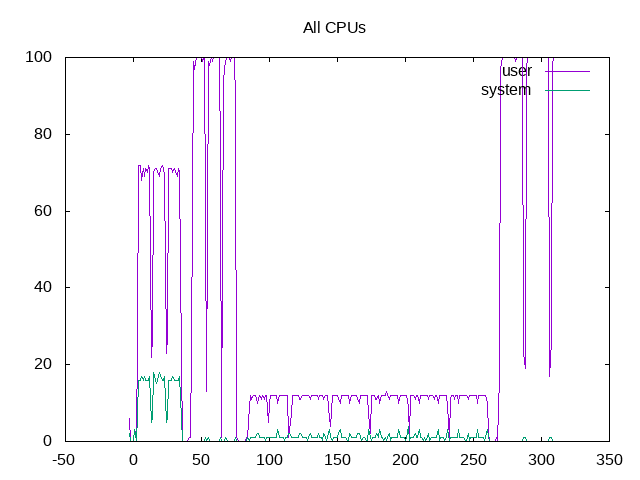Benchmark for monitoring real time performance of the Go implementation for HTTP, JSON and garbage testing per iteration.
‘
This benchmark has four workloads. The Phoronix article only compared the json workload and that is what I’ve placed in the overall “metrics” list. However, in examples below I go through all four workloads.
Here is a comparison between my Haswell i7-4770S and Ryzen 7 1700 box in overall performance:
Intel: 1. http - 9,537 nanoseconds/operation 2. json - 16,334,521 nanoseconds/operation 3. build - 13,686,585,291 nanoseconds/operation 4. garbage - 3,389,072 nanoseconds/operation AMD: 1. http - 9,443 nanoseconds/operation 2. json - 9,140,214 nanoseconds/operation 3. build - 16,601,937,035 nanoseconds/operation 4. garbage - 1,911,564 nanoseconds/operation
Of most interest will be the json benchmark that is otherwise compared.
Before going to the metrics, a chart to show user/system time on the four workloads.

This basically shows the second workload (json) at close to 100% cpu and the http workload also close to 100% but with more system time. The build benchmark is much lower and the garbage workload again near 100%
phoronix-test-s - pid 4418 On_CPU 0.950 On_Core 7.603 IPC 1.079 Retire 0.510 (51.0%) FrontEnd 0.377 (37.7%) Spec 0.071 (7.1%) Backend 0.042 (4.2%) Elapsed 234.67 Procs 4638 Minflt 4821368 Majflt 2 Utime 1668.82 (93.5%) Stime 115.36 (6.5%) Start 191332.56 Finish 191567.23
Above are the metrics for the entire test run. As compared with the chart above, there is some extra double counting going on. I’ve seen this before (threads exit and their user+system time gets accrued to their siblings resulting in double counting; and even >100% On_CPU scores that doesn’t make sense). Otherwise, the code is fairly frontend centric.
These metrics can be broken out into individual workloads
sh - pid 4650 On_CPU 1.742 On_Core 13.936 IPC 0.614 Retire 0.315 (31.5%) FrontEnd 0.594 (59.4%) Spec 0.036 (3.6%) Backend 0.055 (5.5%) Elapsed 10.18 Procs 64 Minflt 34192 Majflt 0 Utime 105.59 (74.4%) Stime 36.28 (25.6%) Start 191335.21 Finish 191345.39
http – clearly the On_CPU/On_Core are bogus.
sh - pid 4845 On_CPU 1.917 On_Core 15.334 IPC 1.347 Retire 0.636 (63.6%) FrontEnd 0.315 (31.5%) Spec 0.016 (1.6%) Backend 0.033 (3.3%) Elapsed 10.13 Procs 64 Minflt 98981 Majflt 0 Utime 155.16 (99.9%) Stime 0.17 (0.1%) Start 191375.80 Finish 191385.93
json also front-end heavy.and clearly bogus On_CPU.
sh - pid 5037 On_CPU 0.113 On_Core 0.904 IPC 1.596 Retire 0.670 (67.0%) FrontEnd 0.334 (33.4%) Spec 0.333 (33.3%) Backend -0.337 (-33.7%) Elapsed 28.27 Procs 1268 Minflt 1363500 Majflt 0 Utime 24.35 (95.3%) Stime 1.20 (4.7%) Start 191416.25 Finish 191444.52
Build with metrics that don’t make sense.
h - pid 8851 On_CPU 1.865 On_Core 14.919 IPC 1.062 Retire 0.507 (50.7%) FrontEnd 0.306 (30.6%) Spec 0.066 (6.6%) Backend 0.122 (12.2%) Elapsed 17.99 Procs 65 Minflt 95132 Majflt 0 Utime 268.10 (99.9%) Stime 0.30 (0.1%) Start 191511.27 Finish 191529.26
garbage similar to above.
Metrics (AMD) - phoronix/go-benchmarkphoronix-test-s - pid 32312 On_CPU 0.670 On_Core 10.721 IPC 1.124 FrontCyc 0.137 (13.7%) BackCyc 0.165 (16.5%) Elapsed 232.76 Procs 4958 Minflt 5069668 Majflt 0 Utime 2319.05 (92.9%) Stime 176.45 (7.1%) Start 176363.88 Finish 176596.64
Overall AMD metrics
sh - pid 408 On_CPU 1.853 On_Core 29.640 IPC 1.357 FrontCyc 0.129 (12.9%) BackCyc 0.197 (19.7%) Elapsed 10.57 Procs 94 Minflt 153842 Majflt 0 Utime 312.64 (99.8%) Stime 0.66 (0.2%) Start 176407.73 Finish 176418.30
Metrics for the json portion.
Process Tree - phoronix/go-benchmark
Process Tree
Overall process tree for all workloads.
 About this graph
About this graph
The build shows some chaos, partially because much of it runs single-threaded and would be better to pin to just one or two threads.

The IPC for json is ~1.35.
 About this graph
About this graph
Overall topdown metrics show how frontend bound clearly plays a role in the json workload.
Next steps: Cross-comparing with perf(1), that this benchmark is front-end heavy is consistent with perf(1). For example:
root@popayan:/var/lib/phoronix-test-suite/installed-tests/pts/go-benchmark-1.1.4# perf stat -a --topdown ./json
pkg: golang.org/x/benchmarks
goos: linux
goarch: amd64
2018/04/21 22:34:36 Benchmarking 1 iterations
2018/04/21 22:34:36 Benchmarking 100 iterations
2018/04/21 22:34:38 Benchmarking 500 iterations
# memprof=/tmp/11.prof.txt
# cpuprof=/tmp/10.prof.txt
BenchmarkJSON-8 500 16333616 ns/op 4904960 GC-bytes-from-system 175262 STW-ns/GC 36454 STW-ns/op 7883987 allocated-bytes/op 105444 allocs/op 134150456 bytes-from-system 120848384 heap-bytes-from-system 7479608 other-bytes-from-system 130867200 peak-RSS-bytes 136753152 peak-VM-bytes 917504 stack-bytes-from-system 129950956 user+sys-ns/op
Performance counter stats for 'system wide':
retiring bad speculation frontend bound backend bound
S0-C0 2 62.9% 1.5% 31.6% 3.9%
S0-C1 2 63.3% 1.6% 31.1% 4.0%
S0-C2 2 63.0% 1.5% 31.5% 4.0%
S0-C3 2 63.2% 1.6% 31.1% 4.1%
10.105945577 seconds time elapsed
So I think there are two general areas to work further: (1) improve the integrity of data in some areas like On_CPU and similar metrics. Most likely better accounting with threads to avoid double-counting and (2) drill deeper in the front-end nature of the benchmark, e.g. instruction caches, tlbs, etc. Some of this makes sense as an interpretive language, but dissect the factors and also why speculation is not a bigger factor.
According to the benchmark page larger differences between Ubuntu 16.04 (go version 1.6) and Ubuntu 18.04 (go version 1.10) most likely changes in the interpreter/compiler system.
